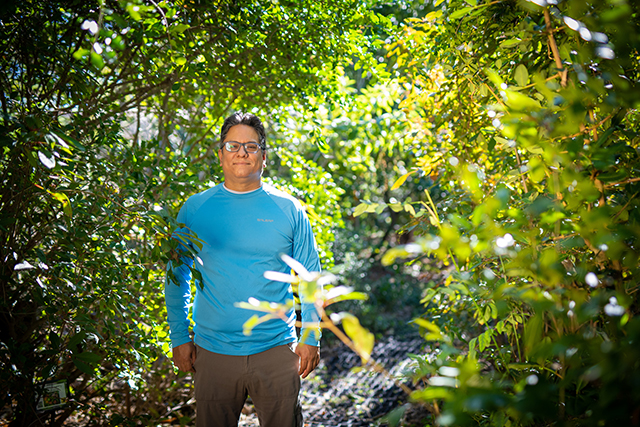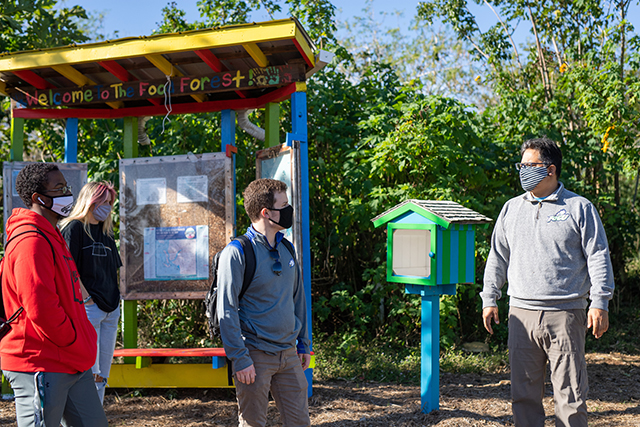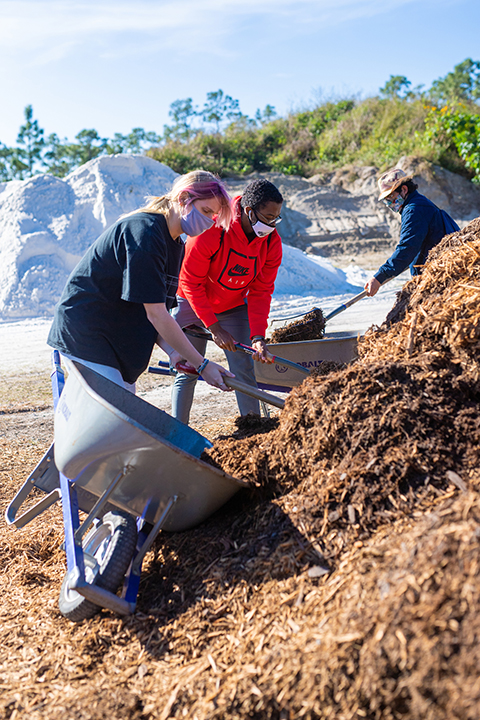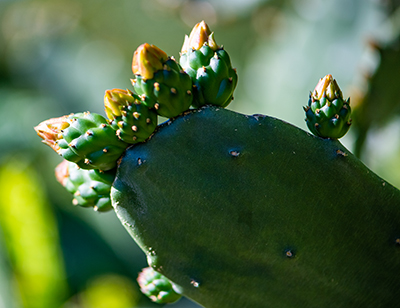
Marco Acosta had invested about 20 years in the information technology field when he decided to take an entry-level horticulture class. He’d always enjoyed growing things but didn’t realize at the time that he was planting the seed for a significant career change.
From indoor, climate-controlled offices, he transplanted himself into the elements outdoors. The hardware he works with now? Not servers and desktop computers but chainsaws, pitchforks and pruners.
“It is a leap,” acknowledges Acosta, who was recently appointed as manager for FGCU’s flourishing Food Forest, a part-time position that has long been needed. “This job has solidified that I’ve made the right decision. I’m really happy doing what I’m doing, working with plants and plant science.”
Before moving to Southwest Florida with his wife, Heather Skaza-Acosta, an assistant professor in FGCU’s Department of Ecology & Environmental Studies, he earned an associate’s degree in environmental horticulture from the College of Southern Nevada. After working at a native plant nursery in Fort Myers and doing invasive plant removal for an environmental company, Acosta enrolled at FGCU, where he graduated in December with an interdisciplinary studies degree and agribusiness minor. He also earned certificates in permaculture design and cannabis studies.
“I realized I wanted to be in the sustainable and regenerative agriculture field more than spraying chemicals on invasive plants,” he said while chatting at a shaded picnic table in the Food Forest. “I started getting into permaculture design with Alex Nikesch’s classes. When I went back to school here, I discovered the Food Forest. I became a volunteer, fixing irrigation or whatever needed to be done. I loved spending time here. It’s inspiring for me to be here.”

Now, in true FGCU Effect fashion, he’s inspiring others to spend time there, nurturing knowledge about tropical and subtropical plants and fruit trees, soil management and sustainable food production while also overseeing management and planning for the half-acre garden. In almost 10 years since the first seedlings were planted, the jungle-like greenspace between the Sugden Welcome Center and Kleist Health Education Center has weathered a variety of challenges from hurricane damage, budget limitations and continual turnover in student stewardship.
Yet, firmly rooted in FGCU’s sustainability and interdisciplinary values, the Food Forest has yielded a bumper crop of dividends: nourishing food, contemplative time and service-learning opportunities; hands-on learning about native plants, soil science and sustainable agriculture as well as a leadership, communication and civic engagement skills; and alumni entrepreneurs who are transplanting their Food Forest experience into the business world and creating jobs.
Acosta’s mission is to take to the next level. Priorities this spring include increasing food production, expanding the irrigation system, cutting back overgrown trees and identifying some mystery plants.
“The canopy needs to be cut back to make sure more layers of plants get the sunlight they need to photosynthesize and bear more fruit,” Acosta said. “Some invasive species have gotten in that we need to remove — carrotwood, Brazilian pepper, earleaf acacia. There are also a lot of trees here that we can’t identify. We need to label them all correctly to improve the educational aspect of Food Forest.”
In the short term, volunteers will help get annual beds planted to produce crops such as tomatoes, peppers and squash that students can harvest for cooking or for donating to the Campus Food Pantry.

A year ago, the Food Foresters student group was still grappling with damage from Hurricane Irma, which hit Southwest Florida in 2017 with peak wind gusts of 142 mph in Naples. The storm tore down fencing, broke limbs and knocked over trees, crushing parts of the understory.
One of the bigger long-term challenges, as Acosta already knows from his volunteer days, is continuity in student involvement.
“The institutional knowledge doesn’t stick,” he said. “You get a group of coordinators out here who are knowledgeable about what they do, and the they graduate or find other work and move on. The ‘each one teach one’ approach needs to be improved, so we’re passing on that knowledge for the next person who comes through.”
To cultivate more stability, Acosta is encouraging more faculty to develop curriculum and research projects based in the Food Forest that cross disciplinary lines.
“The Center for Agribusiness, environmental studies, The Water School — they all could have application here,” he said. “There are even a couple math faculty members interested in doing projects out here. We add a large component to the multi-disciplinary and sustainability-minded aspect of this university.”
Only a few masked students came out for service-learning on a recent Friday morning — though turnout was probably nipped in the bud by temperatures dipping into the upper 40s. Fernando López Flores was one of those volunteers gamely hauling mulch to enhance the forest’s beds; the music major is more accustomed to fingering keyboards than hefting a wheelbarrow and pitchfork, but he was eager to lend a hand and spend time in nature — one of the soul-soothing side benefits of the Food Forest.
“I’ve been spending a lot of time indoors preparing for my junior recital, so it’s nice to be outside,” he said. “It also reminds me of Bolivia, where I’m from.”
Ripening papayas, sapodillas and tangerines dangled overhead as Acosta led the students on a tour along the winding garden path. He talked about Florida’s declining citrus industry, the importance of diversifying agriculture and the principles and practices of permaculture — an ecological system that maximizes sustainability and productivity while minimizing maintenance.

López Flores stopped to snap a quick pic of a black racer sunning itself in serpentine serenity beside the path under a mulberry tree that had shed most of its greenery for winter. Zebra longwing butterflies flitted amid the tangle of greenery, while catbirds and hawks cried from unseen perches.
Acosta plucked a few leaves from an allspice branch (Pimenta dioica) and handed them to the students to sniff under their cloth masks — though the tree’s pungent, warming aroma could easily permeate their personal protective gear. Its seeds and leaves are used in cooking, especially in the Caribbean, and some research shows they have beneficial medicinal properties. Plants commonly used in folk medicine are scattered through the garden, as Acosta pointed out on the tour.
“That indigenous knowledge is getting lost,” he said, along with the understanding of where food comes from. “The Food Forest has to be part of that education process through growing food or talking about sustainable agriculture. We need to get the word out and see where we can improve things.”[/vc_column_text][vc_column_text]
ABOUT MARCO ACOSTA
- Age: 45
- Hometown: Born in Los Angeles, raised in Las Vegas
- Food Forest fave: Tamarind. My grandfather had one in his corral in Mexico that provided generations of our family with a lovely place to relax and host family events.
- Favorite food outside the forest: Mexican is my soul food.
- Music to garden by: Reggae — is there any other music for gardening?
- Other interests: Collecting and restoring antique tools and lanterns. I’m still an avid fan of anything IT related; I’m constantly building and fixing laptops and PCs.
- Personal hero/role model: Labor leader and civil rights activist Dolores Huerta.
- Favorite place to be outside of the Food Forest: At home in the garden spending time with my family.
- Dream travel destination post-pandemic: Machu Pichu.
- Favorite book: “1984” by George Orwell. I’ve read it about once a year since high school. It’s always a page turner.